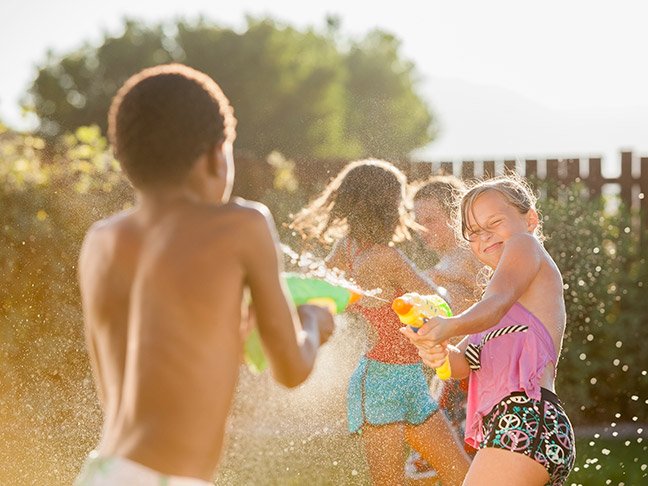My two sons play with brightly colored plastic water pistols when it’s hot outside. For a long time, I was against gunplay but my family pressured me to “quit being such a whiny liberal,” so I relented and let my kids at least have water guns in the summer.
But in the aftermath of the Parkland shooting, the national conversation about kids’ safety has reached a fever pitch. Parents want to know, among other pressing safety issues around guns, are toy guns safe?
Whatever your gut reaction, many experts adhere to the idea that it’s actually natural for kids to explore violence through things like gunplay.
“The pursuits of competition, power, dominance, and victory are normal parts of development, and perfectly emotionally healthy kids possess these urges to varying degrees,” says Angelica Shiels, a Maryland-based licensed clinical psychologist specializing in families. “We often define ‘violent,’ as ‘inflicting real pain on another person.’ By that definition, behaviors such as sports, rough-physical play, battle video games, or even toy guns, are not necessarily even violent, but rather outlets for these natural urges.”
However, even you’re relieved to hear that gunplay is totally normal, Shiels understands that toy guns can still be a complicated issue for parents.
“I think the concern is whether kids are being desensitized to actual violence that inflicts harm or pain when they achieve the rush of pretend-shooting other kids without the actual consequence of harm or pain,” Sheils says.
So does watching or simulating violence numb kids to the harmful effects of violence or lead to aggressive behavior?
There’s a growing amount of research in this area, particularly around video games. The American Psychological Association has even created a resolution about violent video games. Essentially, the APA encourages parents to steer clear of exposing kids to violent media.
“It’s safe to say that pretending to shoot other kids with weapons falls under the umbrella of exposure,” Sheils says. “However, many clinical professionals and researchers disagree with this sentiment and point out research that has challenged the notion that exposure to violence causes increased violent behaviors.”
Shiels goes on to explain that researchers conducted a study in which they controlled for certain kids’ pre-existing fascination with violence. The study authors found that there was no link between exposure to violence and violent behavior in kids who did not already gravitate toward violence.
“The very same kids who have personality tendencies that lead to violent behaviors are the ones who gravitate toward violent games and entertainment,” Sheils says.
Does that mean that old-school game of cops and robbers with the plastic guns okay for most kids? Turns out, yes, it is likely just fine.
“It is not problematic if a child uses a toy gun to act out his natural desire for dominance, competition, and victory so long as he maintains a healthy sense of empathy and respect for the safety of others,” Shiels explains. “If an adult notices that a child takes pleasure in actually causing real harm or is detached from compassion when his playmate’s safety or well-being is compromised, that child is using the gun to act out an anger or attachment issue that would have been present whether or not he picked up the toy gun.”
After chatting with Sheils, I realized that my hesitation to accept gunplay in my home is more about my own fears and anxiety, given recent headline news. I want my children to be safe, and I want them to grow up to be empathetic, kind, productive, creative people. But banning toy guns doesn’t seem like the way to achieve these things. After all, as Sheils explains, kids are going to see violence no matter how well we think we shield them.
“Whether or not you allow gunplay in your own home, your child will likely be exposed to pretend guns in his life,” she says. “Therefore, regardless of your in-home rules, all kids need to be taught lessons about gun safety and the seriousness of actual guns.”
Instead of banning toy guns from the backyard, we’ll be focusing on making sure our kids feel loved, respected, and heard. If we can cultivate a true sense of empathy, then my fears about the potential dangers of gunplay are all for naught. My husband and I have also started family discussions about gun safety including what to do if our kids see a real gun at a friend’s house.
But we’ll continue filling up those water pistols and encouraging old-fashioned summer fun. We’ll just make sure that our kids are playing safe and being kind while they’re at it.
Photo: Getty
